Sick Leave Policy Template
Effective Date: [Insert Date]
Policy Owner: Human Resources Department
Purpose
This policy establishes guidelines for sick leave usage to ensure employees can take necessary time off for health-related issues while maintaining business operations and promoting a healthy workplace.
Scope
This policy applies to all [full-time/part-time/all] employees of [Company Name].
Policy Statement
[Company Name] provides sick leave to support employees who are unable to work due to illness, injury, or medical appointments. We are committed to supporting employee health and well-being while ensuring fair and consistent application of this benefit.
Sick Leave Accrual
Eligible employees accrue sick leave as follows:
Accrual Rate: [X hours per pay period / X days per year]
Accrual Begin Date: [First day of employment / After probationary period]
Maximum Accrual: [X hours/days] (accrual stops once maximum is reached)
Carryover: [X hours/days may be carried over to the next calendar year / No carryover permitted]
Eligible Uses of Sick Leave
Sick leave may be used for:
Personal illness or injury that prevents the employee from performing job duties
Medical, dental, or optical examinations or treatments
Caring for an immediate family member (spouse, child, parent, or [other specified relatives]) who is ill or has a medical appointment
Circumstances related to domestic violence, sexual assault, or stalking (where applicable by law)
Preventive care and routine medical appointments
Notification and Documentation Requirements
Notification Procedures:
Employees must notify their immediate supervisor or manager as soon as possible, preferably [before their scheduled start time / within X hours of shift start]
For planned medical appointments, employees should provide [X days/weeks] advance notice when possible
Notification should include the expected duration of absence
Documentation:
A doctor's note or medical certification may be required for absences of [X consecutive days or more]
Management reserves the right to request medical documentation if there is reason to believe sick leave is being misused
Documentation must be submitted within [X days] of return to work
Compensation During Sick Leave
Sick leave is paid at the employee's regular rate of pay
Sick leave does not count as hours worked for overtime calculation purposes
[Unused sick leave is/is not paid out upon termination of employment]
Intermittent and Reduced Schedule Leave
Employees may use sick leave on an intermittent or reduced schedule basis when medically necessary, subject to supervisor approval and proper documentation.
Coordination with Other Leave
Sick leave runs concurrently with [FMLA/state family and medical leave] when the absence qualifies under both policies. Employees should consult with Human Resources regarding the interaction of sick leave with other leave types.
Abuse of Sick Leave
Misuse or abuse of sick leave, including providing false information or using sick leave for unauthorized purposes, may result in disciplinary action up to and including termination of employment.
Compliance with Local and State Laws
This policy complies with applicable federal, state, and local sick leave laws. Where local or state law provides greater benefits, those provisions will supersede this policy.
Policy Review
This policy will be reviewed annually and updated as necessary to reflect changes in business needs or legal requirements.
Questions or Concerns: Employees should contact the Human Resources Department at [contact information] with any questions about this policy.
Acknowledgment: I have read, understand, and agree to comply with this Sick Leave Policy.
Employee Signature: _________________________ Date: _____________
Employee Name (Print): _________________________
Sick Leave Policy Template
1.PURPOSE:
1.1 To standardize the processing of sick leave.
1.2 To notify the employees about the policy and procedure.
2. POLICY
2.1. No sick leave will be paid during the probation period; that is, within the first three to six months of employment (Probationary period as stipulated in contract).
2.2. If the Employee has completed the probation period (confirmation letter is received) the employee is entitled to sick leave as follows
As per the country Labor law:
2.2.1 Full salary for the first 15 days; (nonconsecutive as well as consecutive)
2.2.2 Half salary for the next 30 days; (nonconsecutive as well as consecutive)
2.2.3 Any following period will be without salary – for a period of up to three months (90 days);
2.2.4 Chronic sickness and/or conditions necessitating termination of
Contract are addressed as per Labor law.
2.2.5 This amount is per year of service; sick leave is NOT cumulative
2.2.6 The employee may be terminated if he/she has exhausted their full sick leave and has not returned to work. In such cases negotiation may entitle the employee to their full gratuity and end of service benefits.
2.2.7 Maternity leave followed by sick leave is dealt with in the Leave, maternity Policy and Procedure
2.3 Sick leave will not be approved over the phone unless it is an emergency. If an emergency occurs the Employee needs to bring the medical certificate within 48 hours for approval by the director. It needs to be scanned and attached in the Oracle Fusion HR system as part of the application for sick leave. A manager will receive information regarding the sick leave on the system only after approved by the Director.
2.4. Sick leave will be informed to the direct manager only after the authorized doctor issues the Medical Certificate, and it is approved by the MD. The staff member should inform the Manager, out of courtesy, at least 2 hours before their duty schedule starts, allowing some time to manage the shortage/absence.
2.5. If sick leave is granted and an extension is required then 2.3 and 2.4 apply for the extension. Correlative diagnostic tests (Lab / X-ray) should be utilized.
2.6. All consultant issued sick leaves must be attested.
2.7 Medical Certificate must be issued for each period of sickness and cannot be for longer than 1 day at a time, except when sickness is confirmed to be infectious.
2.8 The Medical Certificate must be uploaded into the Oracle Fusion HR system along with the sick leave request by the concerned member of staff in order to update the system.
2.9 Potentially infectious cases will be given sick leave according to the incubation period and Infectivity, and 2.7.
2.10 Elective surgery requiring sick leave needs to be pre-approved by the department manager/deputy COO (as per the medical report), and as per the Oracle Fusion HR system prior to Regulatory authorities and Insurance approvals. Employees abusing this process will be cautioned and may be subject to Disciplinary procedures.
2.11 Plastic /cosmetic surgery is not approved for sick leave. Employees must use annual / unpaid leave to facilitate cosmetic/plastic surgery procedures; all relevant rules for annual and unpaid leave apply.
3. PROCEDURE
3.1 A staff member who feels sick shall notify their Department manager if they are unable to come to work at least 2 hours prior to their shift. The staff member is responsible to obtain a sick leave certificate from the doctor.
3.2 The Employee will be responsible for obtaining the sick leave medical certificate, and upload it into the Oracle Fusion HR system for approval by the Department Head and then the information is sent to Oracle, and the department head is informed.
3.3 If an employee requires elective surgery that includes sick leave, a medical report MUST accompany the request. The specific dates must be discussed and approved by the HOD/COO before the booking of the surgery.
4. REFERENCES
4.1 Labor Law
5. ATTACHMENTS: None
What is a Sick Leave Policy and Why Do Organizations Need It?
A sick leave policy is a formal document that outlines the rules, procedures, and entitlements regarding employee absences due to illness or medical conditions. Organizations need this policy to:
- Establish clear expectations for reporting illness and requesting time off
- Ensure fair and consistent treatment of all employees
- Comply with legal requirements and labor regulations
- Maintain operational continuity during employee absences
- Protect both employee rights and business interests
- Reduce confusion and potential disputes about leave entitlements
- Create a framework for managing workforce attendance
Who Should Issue Sick Leave Communications?
The authority to issue sick leave-related letters depends on the specific situation:
- HR Department: Policy announcements, formal approvals, and documentation requests
- Direct Supervisors/Managers: Day-to-day absence approvals and informal confirmations
- Department Heads: Extended leave approvals and complex cases
- Executive Management: Company-wide policy changes or major announcements
- Employees: Sick leave requests and medical documentation submissions
- Medical Officers: Fitness-to-return certifications in larger organizations
When Are Sick Leave Letters Required?
Sick leave correspondence becomes necessary in various scenarios:
- When an employee needs to request time off due to illness
- Upon returning to work after an extended absence
- When medical documentation is required for verification
- During policy updates or annual policy reviews
- When addressing excessive absenteeism concerns
- For approving or denying leave requests
- When requesting extensions to previously approved leave
- For documenting chronic health conditions requiring accommodation
- During performance reviews involving attendance issues
Employee Sick Leave Request - Short-Term Illness
Subject: Sick Leave Request - [Your Name] - [Date]
Dear [Manager's Name],
I am writing to inform you that I am unwell and unable to report to work today, [Date]. I have been experiencing [brief description: fever/flu symptoms/migraine] since last night and believe I need to rest and recover to avoid spreading illness to colleagues.
I anticipate returning to work on [Expected Return Date]. I will ensure that all urgent tasks are either completed remotely if possible or delegated appropriately. [Colleague's Name] has been briefed on the [Project Name] deadline and can handle any immediate concerns.
I will keep you updated on my condition and inform you immediately if my absence needs to be extended. Please let me know if you require any medical documentation.
Thank you for your understanding.
Best regards,
[Your Name]
[Contact Information]
Employee Sick Leave Request - Extended Medical Leave
Subject: Request for Extended Medical Leave
Dear [HR Manager/Supervisor Name],
I am writing to formally request an extended medical leave of absence from [Start Date] to [Expected End Date], approximately [number] weeks. Unfortunately, I have been diagnosed with [condition - be as specific as comfortable] and my physician has advised that I require this time for treatment and recovery.
I have attached a medical certificate from my doctor, Dr. [Name], confirming the diagnosis and recommended leave duration. I am committed to providing any additional documentation you may require and will keep you informed of my recovery progress.
During my absence, I propose the following arrangements:
- [Colleague Name] will handle my ongoing projects related to [specify]
- I have prepared detailed handover notes for all active assignments
- I can be reached via email for critical questions, though response times may be delayed
I understand the impact of my absence and have worked to minimize disruption. I am hopeful about my recovery and look forward to returning to full duties as soon as medically cleared.
Please let me know if you need any additional information or if there are specific procedures I should follow.
Sincerely,
[Your Name]
[Employee ID]
[Department]
[Contact Information]
Manager's Approval of Sick Leave Request
Subject: Sick Leave Approved - [Employee Name] - [Dates]
Dear [Employee Name],
Your request for sick leave from [Start Date] to [End Date] has been approved. We hope you have a speedy recovery and want you to focus entirely on your health during this time.
Your leave has been recorded in our system, and your absence will be marked as approved sick leave. Please remember to submit any required medical documentation within [number] days of your return, as per company policy.
If you need to extend your leave, please contact us as soon as possible with updated medical certification. We have arranged for [Colleague Name] to cover your responsibilities during your absence.
Take care and feel better soon.
Best regards,
[Manager Name]
[Title]
[Department]
Request for Medical Documentation
Subject: Request for Medical Documentation - Sick Leave [Dates]
Dear [Employee Name],
We acknowledge your recent sick leave absence from [Start Date] to [End Date]. As per our company's sick leave policy, absences exceeding [number] consecutive days require supporting medical documentation.
Please provide a medical certificate or doctor's note that includes:
- The dates you were under medical care
- Confirmation that you were unfit for work during this period
- Any relevant restrictions or accommodations needed upon return
This documentation should be submitted to the HR department within [number] business days. You may submit it via email to [email address] or deliver a physical copy to the HR office.
This is a standard procedural requirement and helps us maintain accurate leave records. If you have any questions or difficulty obtaining this documentation, please contact us immediately.
Thank you for your cooperation.
Regards,
[HR Manager Name]
Human Resources Department
[Contact Information]
Return to Work Medical Clearance Requirement
Subject: Medical Clearance Required Before Returning to Work
Dear [Employee Name],
We trust you are recovering well from your recent medical leave. Before you return to your duties on [Expected Return Date], we require a medical clearance certificate from your treating physician.
This certificate should confirm that you are medically fit to resume your regular job responsibilities without restrictions. If your doctor recommends any temporary work modifications, accommodations, or a phased return schedule, please ensure these are clearly documented.
Please submit this clearance to the HR department at least [number] days before your intended return date. This allows us to make any necessary arrangements and ensures your safety and wellbeing in the workplace.
If you anticipate any delays in obtaining this documentation or need to adjust your return date, please inform us as soon as possible.
We look forward to having you back on the team.
Best wishes,
[HR Manager Name]
Human Resources
[Contact Information]
Sick Leave Policy Update Announcement
Subject: Important Update to Sick Leave Policy - Effective [Date]
Dear Team,
We are writing to inform you of important updates to our Sick Leave Policy, effective [Date]. These changes have been made to better support employee wellbeing while ensuring operational efficiency.
Key changes include:
- Sick leave entitlement increased from [X] to [Y] days annually
- Same-day notification now accepted via email or company app
- Medical certificates required only for absences exceeding 3 consecutive days
- Introduction of flexible return-to-work arrangements for extended illnesses
- Enhanced support for employees with chronic health conditions
The updated policy document is attached and will be available on the company intranet. Please review it carefully and direct any questions to the HR department.
We encourage everyone to utilize sick leave when genuinely needed. Your health is our priority, and these changes reflect our commitment to maintaining a supportive work environment.
Thank you for your attention to this matter.
Sincerely,
[Executive/HR Director Name]
[Title]
[Organization Name]
Concern Letter Regarding Excessive Absenteeism
Subject: Meeting Request - Attendance Discussion
Dear [Employee Name],
I would like to schedule a meeting with you to discuss your recent attendance record. Our records indicate that you have taken [number] sick leave days over the past [time period], which is above the departmental average and may indicate underlying issues we should address.
This meeting is not disciplinary in nature; rather, it is an opportunity to:
- Understand if there are health concerns requiring workplace accommodations
- Discuss whether you need support accessing medical resources
- Review our sick leave policy and ensure mutual understanding
- Explore solutions that support both your wellbeing and work responsibilities
Please schedule a meeting with me at your earliest convenience. You are welcome to bring a colleague or HR representative if you wish.
We value your contributions to the team and want to ensure you have the support needed to maintain both your health and your performance.
Thank you,
[Manager Name]
[Title]
[Department]
[Contact Information]
Employee Request for Sick Leave Extension
Subject: Request to Extend Sick Leave - [Your Name]
Dear [Manager/HR Manager Name],
I am currently on approved sick leave until [Original End Date]. Unfortunately, my recovery is taking longer than initially anticipated, and my doctor has advised that I need additional time before returning to work.
I am requesting an extension of my sick leave through [New End Date]. I have attached an updated medical certificate from Dr. [Name] supporting this extension and confirming the continued need for rest and treatment.
I sincerely apologize for any inconvenience this extended absence may cause. I remain committed to my recovery so that I can return to full productivity. I am happy to discuss transition arrangements or provide any additional information you may need.
Please let me know if you require further documentation or if there are any procedures I should follow for this extension request.
Thank you for your understanding and continued support.
Regards,
[Your Name]
[Employee ID]
[Contact Information]
How to Write Effective Sick Leave Communications
Creating clear and professional sick leave correspondence requires careful consideration:
- Be Prompt: Notify relevant parties as early as possible, preferably before shift start time
- Be Concise: Provide necessary information without excessive medical details
- Be Professional: Maintain appropriate tone regardless of relationship with recipient
- Be Specific: Include exact dates, expected duration, and any relevant deadlines
- Be Proactive: Suggest coverage arrangements and handover procedures
- Be Compliant: Follow organizational notification procedures and timelines
- Be Honest: Provide truthful information while respecting your privacy boundaries
- Be Respectful: Acknowledge the impact of your absence on team operations
Requirements and Prerequisites Before Requesting Sick Leave
Before submitting a sick leave request, ensure you have:
- Reviewed your organization's sick leave policy and entitlements
- Checked your remaining sick leave balance
- Identified urgent tasks requiring immediate attention or delegation
- Prepared handover notes for ongoing projects
- Obtained or scheduled medical consultation if symptoms are serious
- Noted required documentation thresholds in your company policy
- Identified appropriate contacts for notification (supervisor, HR, team members)
- Prepared to provide reasonable estimates of absence duration
- Understood consequences of exhausting sick leave entitlements
- Saved emergency contact information for workplace communication
Common Mistakes to Avoid in Sick Leave Communications
Protect your professional reputation by avoiding these errors:
- Waiting too long to notify: Inform your employer immediately, not hours after your shift starts
- Over-sharing medical details: Provide necessary information without graphic descriptions
- Making unrealistic promises: Don't commit to working while sick or returning prematurely
- Neglecting documentation: Missing deadlines for medical certificates can jeopardize leave approval
- Inconsistent social media activity: Avoid posting activities that contradict your illness claim
- Ignoring work responsibilities: Failing to arrange coverage shows poor professionalism
- Using casual language inappropriately: Match your tone to organizational culture
- Fabricating illnesses: Dishonesty can lead to termination and damage trust permanently
- Missing follow-up communication: Keep employer updated if circumstances change
- Forgetting to submit proper forms: Administrative requirements matter as much as notification
Formatting Guidelines for Sick Leave Letters
Professional sick leave communications should follow these standards:
- Length: Keep requests concise (150-300 words for simple requests, up to 500 for complex situations)
- Tone: Professional and respectful, regardless of workplace culture
- Subject Line: Clear and specific (include name, dates, and purpose)
- Timing: Send as early as possible, ideally before business hours on the absence day
- Format: Email for quick notification; formal letter for extended leave or official records
- Attachments: Include medical certificates and supporting documents as required
- Contact Information: Provide reliable ways to reach you during absence
- Structure: Opening (notification), Body (details and arrangements), Closing (gratitude and next steps)
- Proofreading: Check for errors - mistakes undermine credibility
- Follow Company Protocol: Use designated forms, systems, or notification channels if required
What to Do After Sending Sick Leave Communications
Your responsibilities continue after submitting your request:
- Monitor responses: Check email regularly for approval confirmations or questions
- Provide updates: Inform employer immediately if your return date changes
- Submit documentation: Obtain and forward medical certificates within specified timeframes
- Maintain availability: Respond to urgent queries within reasonable timeframes
- Prepare for return: Review missed communications and upcoming deadlines before returning
- Attend return-to-work meetings: Participate in any required discussions or medical clearances
- Complete paperwork: Fill out any additional forms or reports upon return
- Thank colleagues: Acknowledge those who covered your responsibilities
- Catch up professionally: Don't expect immediate briefings - proactively seek information
- Reflect on prevention: Consider whether workplace factors contributed to illness
Advantages and Disadvantages of Formal Sick Leave Policies
Advantages:
- Creates clear expectations and reduces confusion about entitlements
- Protects employees from unfair treatment or pressure to work while ill
- Helps employers plan for absences and maintain operations
- Provides legal protection for both parties
- Encourages preventive health measures and reduces workplace contagion
- Establishes documentation trails for compliance and record-keeping
Disadvantages:
- Can feel impersonal and bureaucratic for minor illnesses
- May create anxiety about using legitimate entitlements
- Documentation requirements can burden ill employees
- Inflexible policies may not accommodate all situations
- Can be perceived as lacking trust in employees
- Administrative overhead for tracking and processing
Sick Leave vs. Other Leave Types: Key Differences
Understanding distinctions helps ensure proper usage:
- Sick Leave vs. Personal Leave: Sick leave specifically for illness; personal leave for other reasons
- Sick Leave vs. Vacation: Sick leave unplanned and health-related; vacation scheduled and recreational
- Sick Leave vs. Family Care Leave: Sick leave for employee's illness; family leave for caring for dependents
- Sick Leave vs. Disability Leave: Sick leave short-term; disability leave for extended serious conditions
- Paid vs. Unpaid Sick Leave: Check policy for compensation during absence periods
- Formal vs. Informal Notification: Extended absences require formal documentation; brief illnesses may need only email notification
Tips and Best Practices for Managing Sick Leave
For Employees:
- Build trust through honest and appropriate use of sick leave
- Document chronic conditions with HR to facilitate accommodation
- Keep personal medical records for reference
- Understand your rights and responsibilities under company policy
- Plan ahead for predictable medical appointments when possible
For Employers:
- Foster a culture where employees feel comfortable taking necessary sick leave
- Train managers on consistent policy application
- Respect employee privacy regarding medical information
- Offer wellness programs to reduce overall sick leave usage
- Review patterns to identify potential workplace health hazards
- Ensure accessibility of policy documents and clear communication channels
Essential Elements of Sick Leave Letters
Every sick leave communication should include:
- Clear Subject Line: Immediately identifies purpose and urgency
- Date and Time: When the communication was sent and when absence begins
- Reason for Leave: Brief explanation without excessive medical detail
- Duration: Specific dates or estimated timeframe
- Coverage Arrangements: Who will handle urgent matters during absence
- Contact Information: How to reach you if absolutely necessary
- Documentation Plans: When and how medical certificates will be provided
- Professional Closing: Expression of appreciation and commitment to smooth transition
- Signature: Full name, position, and employee identification if applicable
Optional Attachments:
- Medical certificates (if required immediately)
- Handover documents or task lists
- Contact details for medical provider (for extended leave)


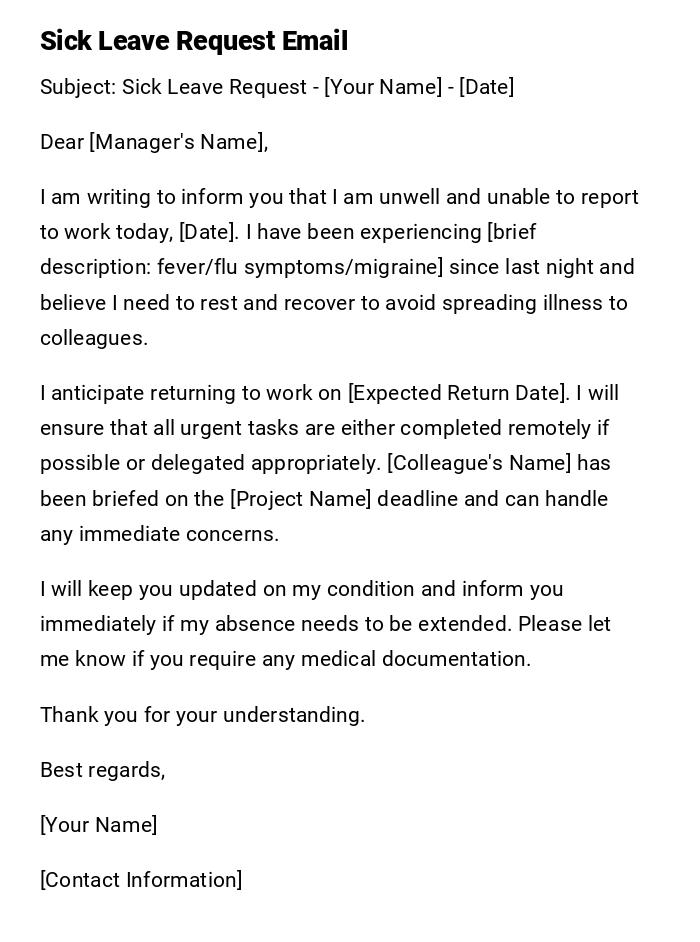
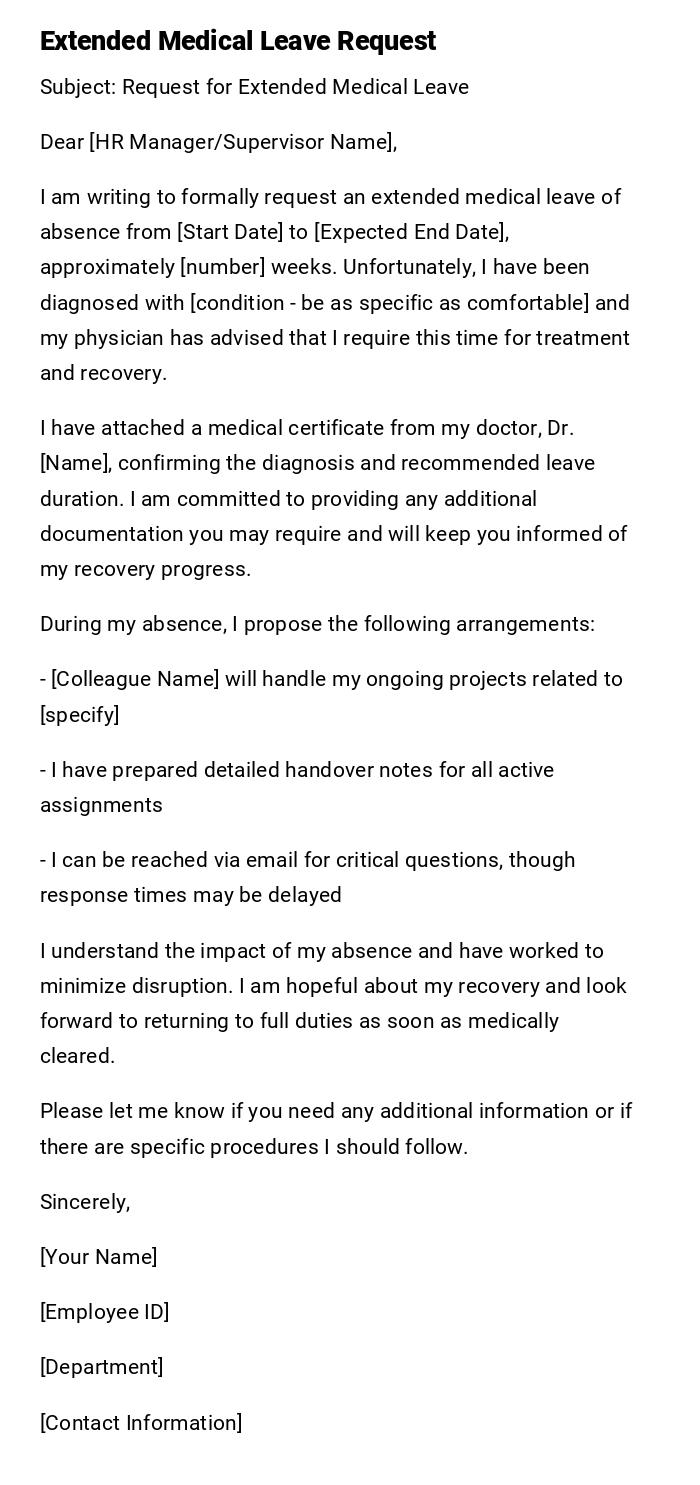
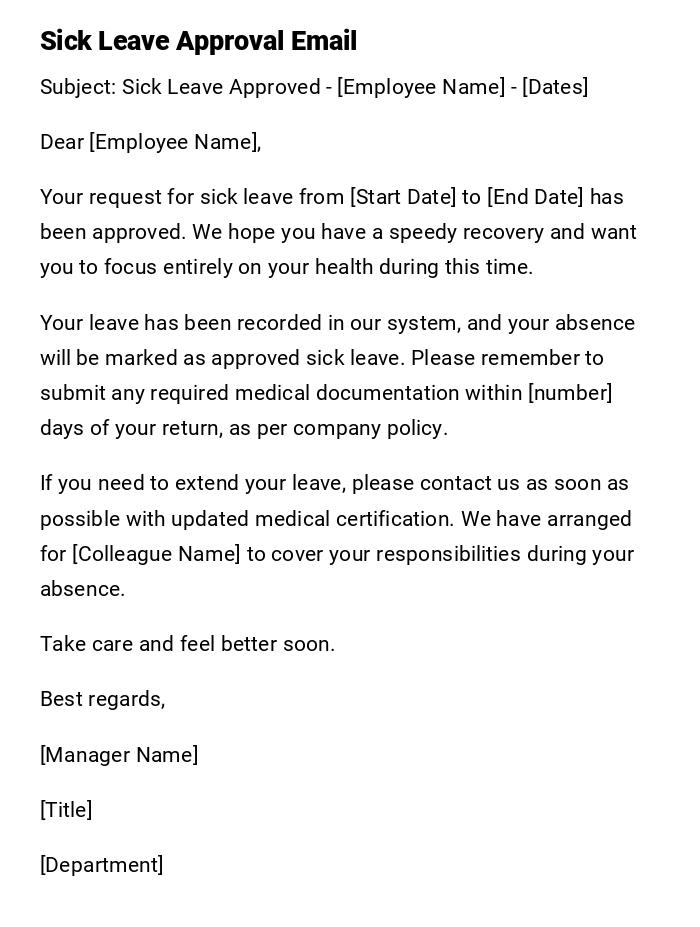
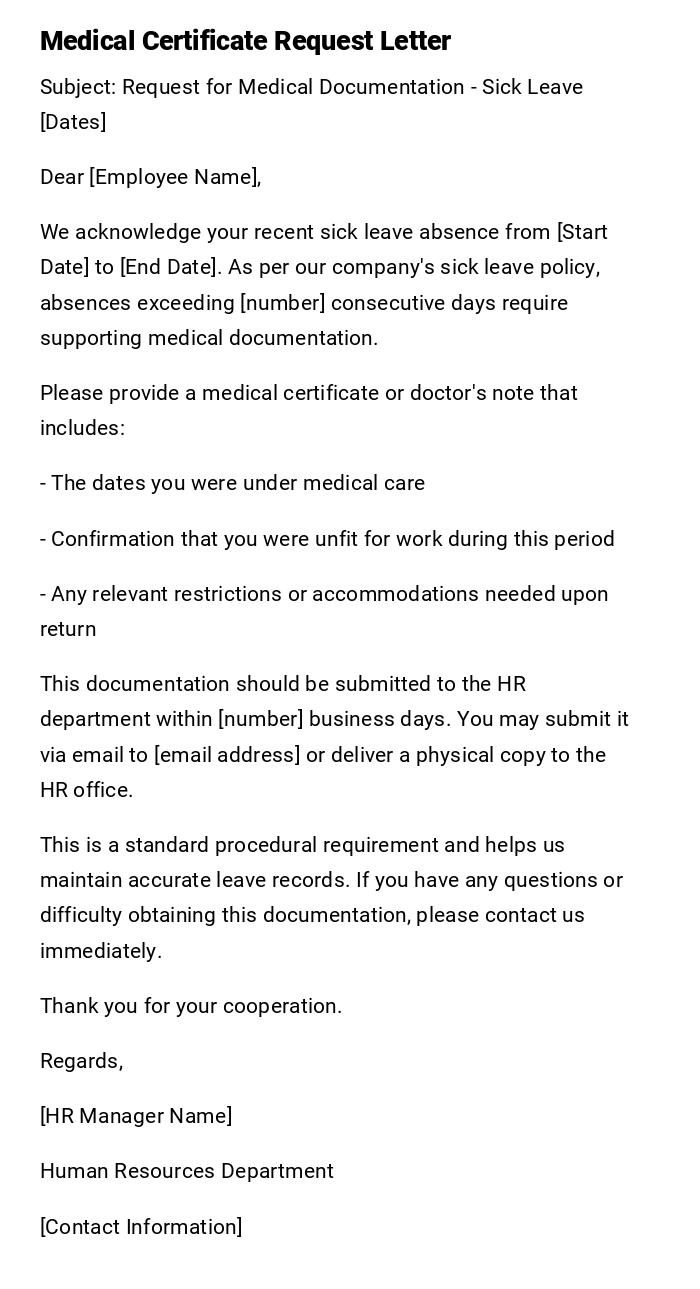
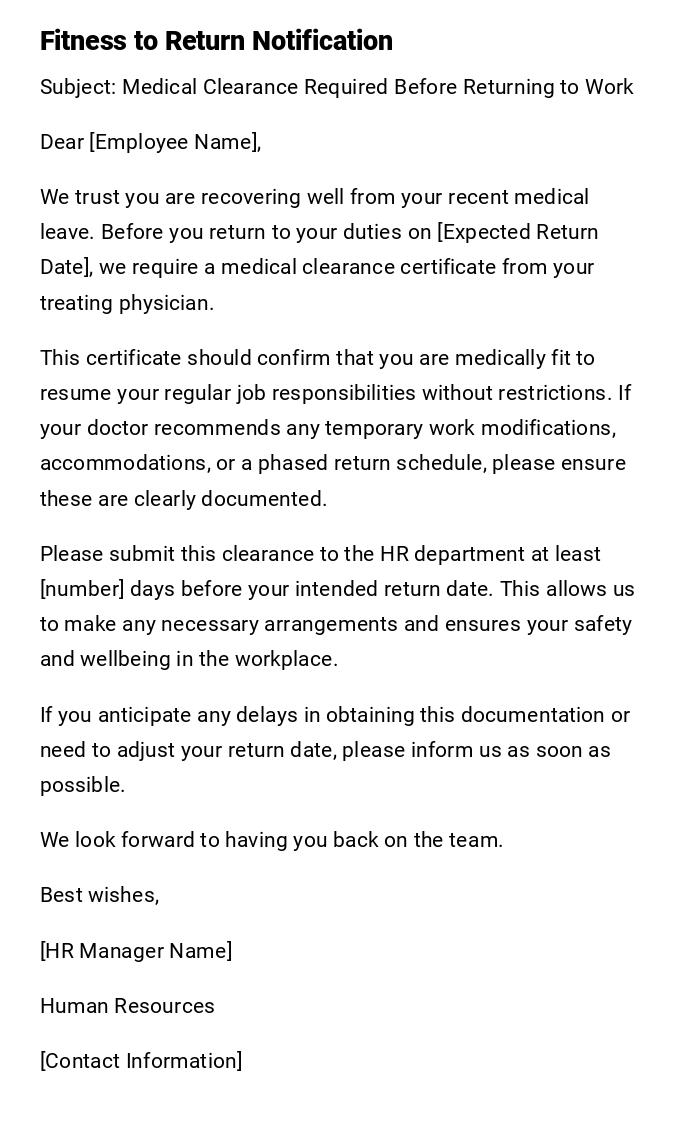
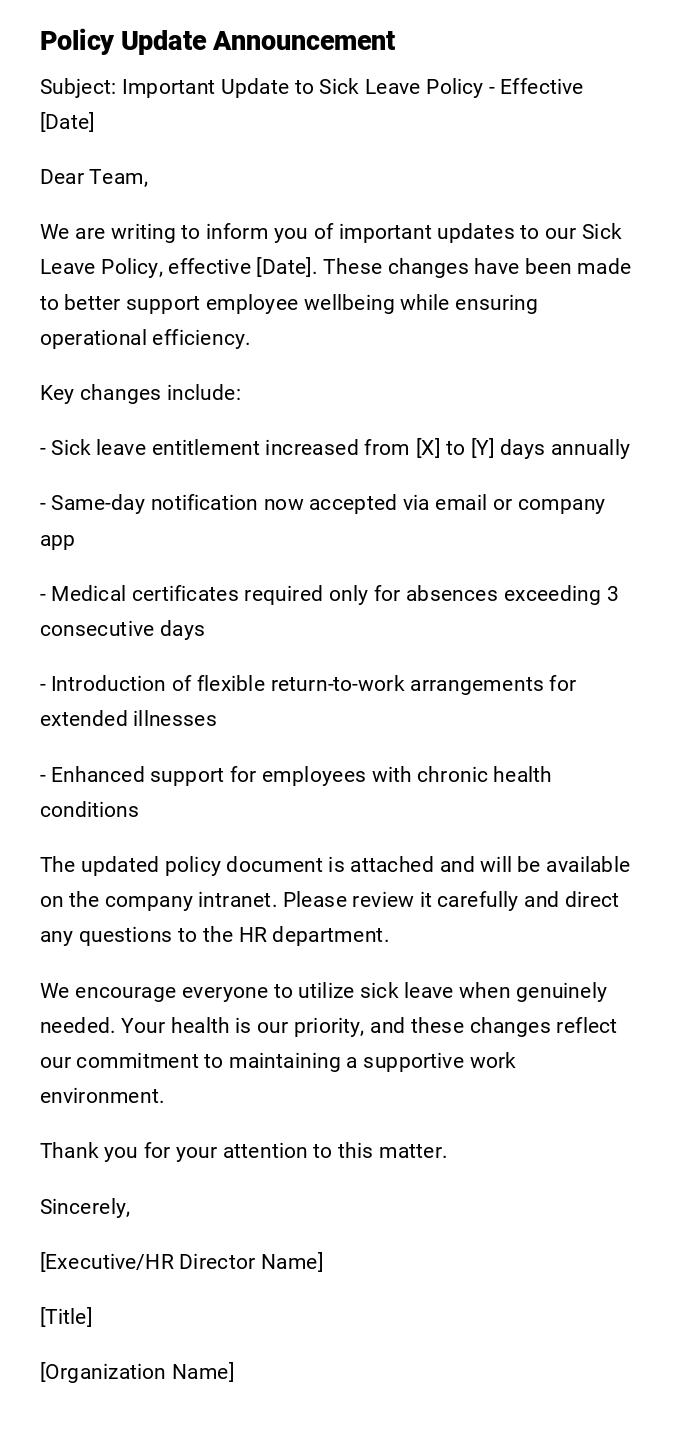
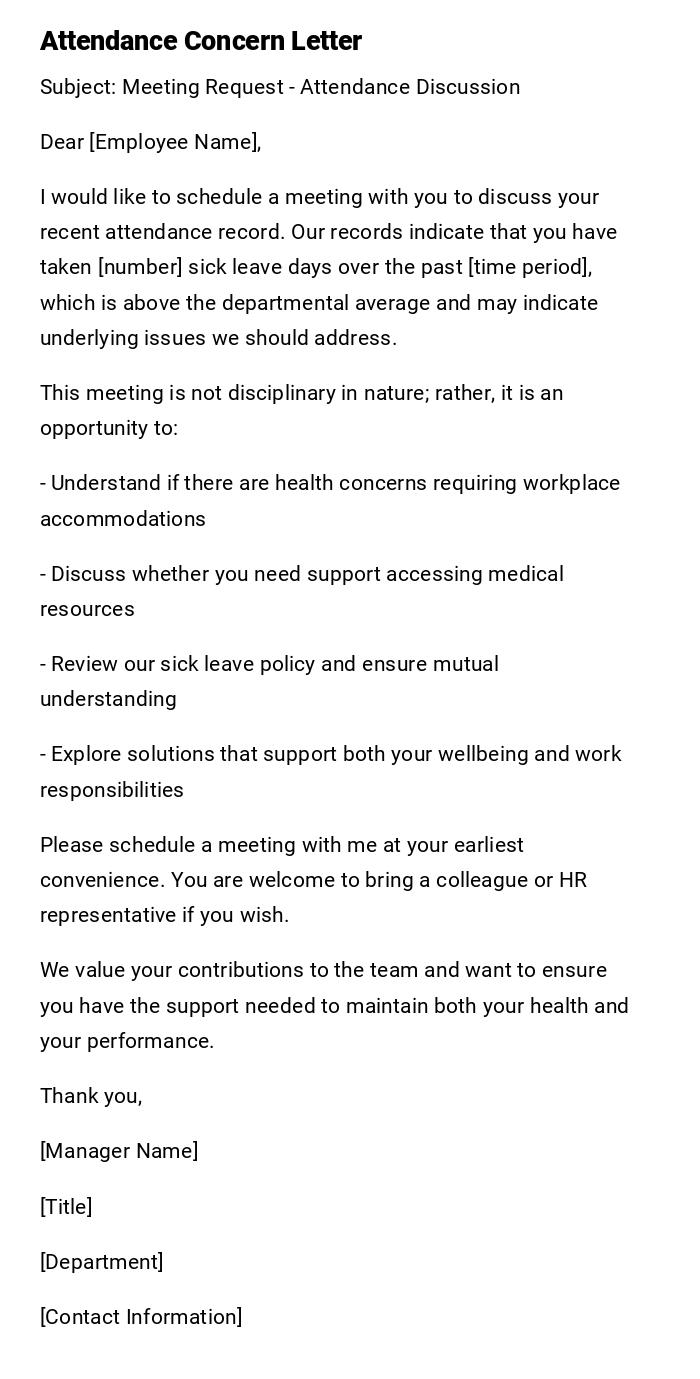
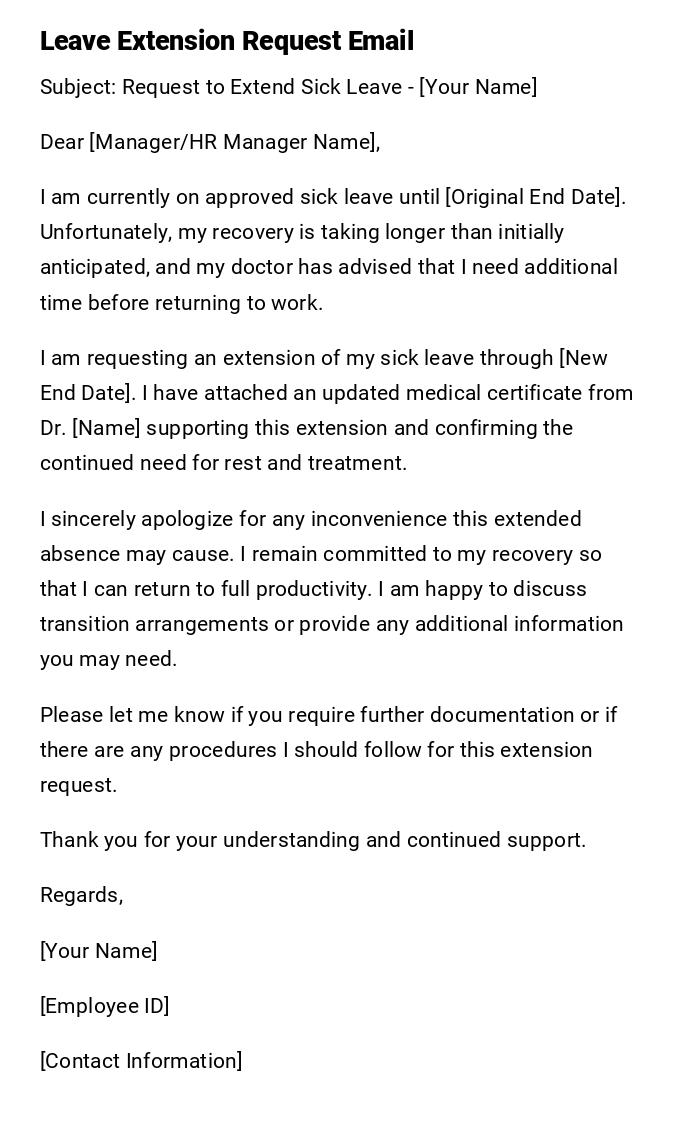

 Download Word Doc
Download Word Doc
 Download PDF
Download PDF